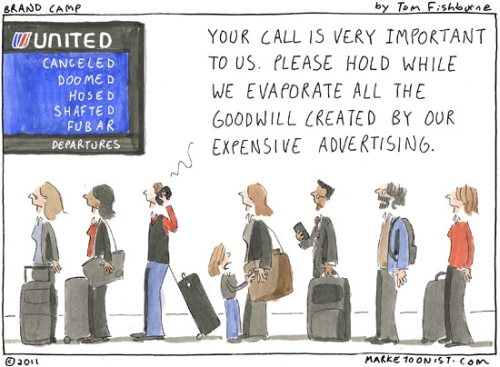Hollow words: United Airlines CEO talks up 'silver lining' of failure

The merger between United Airlines and Continental created the world's largest airline. However, service problems and poor execution have led to increasing complaints against United, which has long suffered from a negative reputation among customers.
Also read:
ZDNet: Hurricane Irene exposes United Airlines' system issues
SpendMatters: United Airlines Should Be Ashamed at How Their Switchover to Continental Systems Has Failed Fliers
Software Insider: Best Practices: From First To Worst – Continental In A Post United World, Lessons In Next Gen Customer Experience
YouTube: United Breaks Guitars
Today's Wall Street Journal features an informative article discussing the challenges and difficulties of merging operations between Continental and United. From that article:
Nearly 20 months after completing their $3.2 billion merger, United and Continental are grappling with the messy business of stitching together two sprawling operations. The process has left many longtime customers fuming, bewildered many of the company's agents and slowed revenue growth
The article quotes Jeff Smisek, United's CEO, in a failure-related comment that demonstrates surprising lack of insight:
Mr. Smisek said in April there was a "silver lining" of the troubled system conversion: United discovered "deficiencies" in how it had dealt with customer service before the switch, and that fixing them will improve service.
To realize a genuine silver lining from failure, three conditions must hold true:
- Awareness that a problem exists. To improve, one must first recognize that a problem exists; after all, if there is no problem, then nothing needs to change.
- Accepting responsibility for creating the conditions that caused the failure. Merely speaking nice words has little value. To gain benefit from failure, one must accept responsibility for the failure itself -- when in doubt, see step one.
- Dedicated commitment to improvement. Having recognized the problem and accepted responsibility for causing it, the next step is commitment to change. Without commitment, improvement is impossible.
Although failure always offers an opportunity to learn and improve, Smisek's comment suggests little sense of accountability or responsibility. Smisek appears to speaks of failure as an abstract occurrence for which he holds no accountability. It is also hard to believe that he was unaware of United's "deficiencies" prior to the system conversion, making the comment seem disingenuous.
Companies that genuinely learn from failure are worthy of respect and admiration; unfortunately, learning is harder than merely talking.
